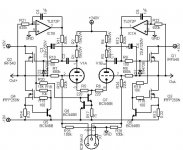anatech said:Hi sajti,
IRFXXXX are used in Canada and the States for audio amplifiers. You are right that they are not designed for this specifically. Adcom uses these as well as others.
When you have enough gain to apply a small amount of feedback, I'd be interested in what you find.
I will change the driver valve to E88CC. This will give more gain (about 20 is possible), so I can reduce it to -say- 4, which means 14dB feedback. I guess that this will gives better bass response, due the higher damping factor. But I have no idea about the upper frequency range....
In this amplifier I use IRF530 (SGS), which is quite linear over .5A, but can dissipate only 60W at 25degree. I still try to find higher power device.
sajti
Upupa Epops said:To sajti : Do you mean, that Halcro amps have not any OL gain ? Do you can miracles with one " stone age " tube and simply follower ? Try to think differently and don't listen only to people who says similar nonsenses.
I don't really believe that one amplifier sound better with 0.000001% distortion, than the other, with 0.1%, or even with 1%.
This simple amplifier was big surprise to me. When I start to put it together it was just a play for me. ...
Stone age had some advantages: No lawyers, no managers.....
sajti
I see using MOSFETs and tubes in open loop as a bad idea. Triodes are particularly linear provided the right I/V operating range [not as wide as desirable], but MOSFETs suffer from a *strong* square law behavior everywhere and they require lots of feedback to linearize, particularly in case of the 'symetric-square-law' found on all class B or AB MOSFET designs
People likes signal degradation produced in exotic ways. People loves asymetric distortion, transformer saturation, loose bass due to speaker ringing at its Fs/Fc, rolled-off frequency responses and power compression, but I wonder why nobody admits this fact
People likes signal degradation produced in exotic ways. People loves asymetric distortion, transformer saturation, loose bass due to speaker ringing at its Fs/Fc, rolled-off frequency responses and power compression, but I wonder why nobody admits this fact
Eva said:I see using MOSFETs and tubes in open loop as a bad idea. Triodes are particularly linear provided the right I/V operating range [not as wide as desirable], but MOSFETs suffer from a *strong* square law behavior everywhere and they require lots of feedback to linearize, particularly in case of the 'symetric-square-law' found on all class B or AB MOSFET designs
People likes signal degradation produced in exotic ways. People loves asymetric distortion, transformer saturation, loose bass due to speaker ringing at its Fs/Fc, rolled-off frequency responses and power compression, but I wonder why nobody admits this fact
The mosfet follower has strong local feedback, due the source follower connection. The IRF530 with 3.5A bias produce gain about 20 with 8ohms load in common source connection. This means 26dB local feedback in the follower.
sajti
But a MOSFET follower does not follow the input voltage, it follows [ intput_voltage - Vgs ] and Vgs tends to be proportional to the square root of Id  . That is the non-linearity and it increases with increasing Id swing and decreases for increasing steady-state bias Id [provided same Id swing]
. That is the non-linearity and it increases with increasing Id swing and decreases for increasing steady-state bias Id [provided same Id swing]
The 'gain' [transconductance] only determines the Vgs variation for a given Id variation, ie: output impedance [that is not constant but inversely proportional to the square root of instantaneous Id
 ]
]
 . That is the non-linearity and it increases with increasing Id swing and decreases for increasing steady-state bias Id [provided same Id swing]
. That is the non-linearity and it increases with increasing Id swing and decreases for increasing steady-state bias Id [provided same Id swing]The 'gain' [transconductance] only determines the Vgs variation for a given Id variation, ie: output impedance [that is not constant but inversely proportional to the square root of instantaneous Id

 ]
]Eva,
I agree what You wrote. This is why the mosfet sounds better with higher bias. Higher bias means less change on the Vgs, due the higher transconductance. This also means lower distortion too.
As I wrote, I will try to apply some feedback with higher gain valve. If there will be news regarding this, I will wrote it!
sajti
I agree what You wrote. This is why the mosfet sounds better with higher bias. Higher bias means less change on the Vgs, due the higher transconductance. This also means lower distortion too.
As I wrote, I will try to apply some feedback with higher gain valve. If there will be news regarding this, I will wrote it!
sajti
- Status
- This old topic is closed. If you want to reopen this topic, contact a moderator using the "Report Post" button.
- Home
- Amplifiers
- Solid State
- [Hybrid Amp] Questions about the use of zener diodes
